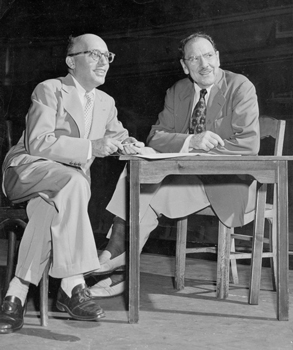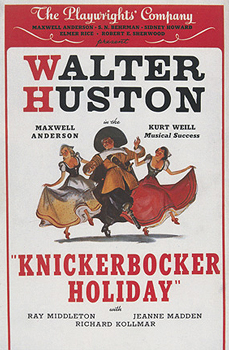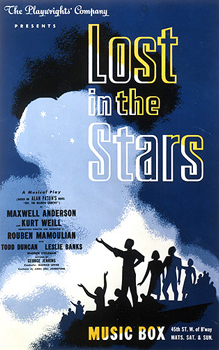Knickerbocker Holiday (1938) and Lost in the Stars (1949) Resource Page

“I guess all governments are crooked, I guess they’re all vicious and corrupt, but a democracy has the immense advantage of being incompetent in villainy and clumsy in corruption.”
— Brom Broeck, Knickerbocker Holiday
“If I stayed, do you know what I would preach here?
. . . That no man knows surely what is evil or what is good! . . . That we are all lost here, black and white, rich and poor, the fools and the wise! Lost and hopeless and condemned on this rock that goes ’round the sun without meaning!”
— Rev. Stephen Kumalo, Lost in the Stars
2011 EVENTS
Knickerbocker Holiday
Collegiate Chorale at Alice Tully Hall
January 25-26, 2011
Featuring: Ben Davis (Brom), Christopher Fitzgerald (Tenpin), Victor Garber (Stuyvesant), David Garrison (Tienhoven), Kelli O’Hara (Tina), and Bryce Pinkham (Washington Irving). Ted Sperling, dir.; James Bagwell, cond.
Lost in the Stars
New York City Center Encores!
February 3-6, 2011
Featuring: Sherry Boone (Irina), Daniel Breaker (Absalom Kumalo), Kieran Campion (Arthur Jarvis), Chuck Cooper (Stephen Kumalo), Quentin Earl Darrington (Leader), Daniel Gerroll (James Jarvis), Jeremy Gumbs (Alex), Patina Miller (Linda), Ted Sutherland (Edward Jarvis), John Douglas Thompson (John Kumalo), and Sharon Washington (Grace Kumalo). Gary Griffin, dir.; Chase Brock, choreo.; Rob Berman, cond.
Kurt Weill + Maxwell Anderson: Collaboration in Musical Theatre
A symposium at CUNY Graduate Center
 February 4, 2011 at 5 pm
February 4, 2011 at 5 pm
Panelists: Stephen Hinton, Elmar Juchem, Kim H. Kowalke; moderator, David Savran.
KNICKERBOCKER HOLIDAY
Knickerbocker Holiday premiered on Broadway on October 19, 1938, starring Walter Huston as Peter Stuyvesant. This pointed satire on American politics yielded the beloved classics “September Song” and “It Never Was You.” Based on Washington Irving’s A History of New York by Diedrich Knickerbocker, the musical is set in 17th-century Manhattan, where the roguish Dutch council eagerly awaits the arrival of their new autocratic governor, Stuyvesant. Hoping to make a good impression, and in the awkward position of having no one to hang on hanging day, they arbitrarily select an independent-minded young man to be their scapegoat. The ensuing contest of wills creates a satirical fable pitting totalitarianism against democracy. Using historical perspective to comment upon the proper size and role of government, Knickerbocker Holiday remains a hilarious and timely piece of political satire.
- Basic information (cast, synopsis, song list, press clippings)
- A historical appreciation by Mark N. Grant

LOST IN THE STARS
Lost in the Stars premiered on Broadway on October 30, 1949, five months before Weill’s death, starring Todd Duncan and Inez Matthews. In this “musical tragedy,” Weill and Anderson gave passionate voice to Alan Paton’s powerful, uncompromising social indictment of apartheid South Africa, Cry, the Beloved Country. The stirring story is of two aging men–a black country parson and a separatist white British planter–who are brought together by a shared grief. The parson’s faith is tested by his wayward son’s unintentional shooting of the planter’s son, while the planter ultimately acquires faith through the same tragedy. With a heartbreaking score that includes “Stay Well,” “Lost in the Stars,” and “Trouble Man,” Lost in the Stars lays bare the tragedy of social barriers among all people, yet it ends with a deeply moving promise of reconciliation and hope for the future.
- Basic information (cast, synopsis, song list, audio files, press clippings)
- A historical appreciation by Mark N. Grant
- Feature article: “Lost in the Stars” from the Spring 2008 Kurt Weill Newsletter
WEILL AND ANDERSON AS COLLABORATORS
- Feature article: “Musical Alchemists” from the Fall 2010 Kurt Weill Newsletter
Kurt Weill met Maxwell Anderson within months of immigrating to the United States in September 1935, and they soon became close friends and collaborators. In 1941 Weill and his wife Lotte Lenya bought a house near the Andersons’, joining an exurban enclave of artists living in Rockland County, N.Y., which also included Burgess Meredith, Milton Caniff, Henry Varnum Poor, and Helen Hayes. Weill and Anderson completed two stage works together, Knickerbocker Holiday (1938) and Lost in the Stars (1949), and had begun work on a musical adaptation of Huckleberry Finn when Weill died in April 1950 after suffering a heart attack. Anderson delivered the eulogy at Weill’s memorial, and a lyric from Lost in the Stars is engraved on Weill’s tombstone.
From Maxwell Anderson’s eulogy given at a memorial concert for Weill in New York’s Lewisohn Stadium on 10 July 1950:
“Kurt Weill was not only my friend and neighbor. We had worked so closely together, had exchanged ideas and criticism so constantly, that in losing him I am crippled and lost. . . . For fifteen years I have had a very great man for my neighbor and friend. How helpful and how loving and keen he was as a person, the world will never know. That goes when a man dies and cannot be recaptured. But how great Kurt Weill was as a composer of music, the world will slowly discover–for he was a much greater musician than anyone now imagines. It takes decades and scores of years and centuries to sift things out, but it’s done in time–and Kurt will emerge as one of the very few who wrote great music.”
The lyric from Lost in the Stars (“A Bird of Passage”) engraved on Weill’s tombstone in Mt. Repose Cemetery, Haverstraw, NY:
This is the life of men on earth:
Out of darkness we come at birth
Into a lamplit room, and then–
Go forward into dark again.
Contact: For more information on this topic, please contact Kate Chisholm, Manager of Promotion and Special Projects at (212) 505-5240 or kchisholm@kwf.org.